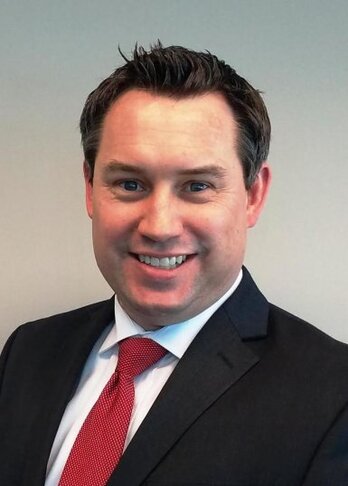Stories of Triumph and Inspiration
Members of Faith share personal experiences that highlight God's love, mercy and guidance.

Jason Loebach
Sometimes it’s hard to find—and hold on to—helpful and useful perspectives about what’s happening all around us. But if you talk with Faith member JASON LOEBACH, you’ll enjoy hearing how he keeps a thoughtful outlook in these times.
With his wife Anna, Jason is the parent of six offspring—a blended family that ranges from 3 years old to 21 years of age. Professionally, he’s an attorney who specializes in business law—primarily representing small companies in the area. For the past 3½ years, he’s served on the Glen Ellyn School District 41, of which he is currently Vice-President. This is a community service he seems to treasure. The wide variety of his roles requires a steady, solid perspective, particularly as it relates to his work as a member of the State of Illinois’ Inclusion Subcommittee of the Early Learning Council of the Governor’s Office of Early Childhood Development.
When you talk with Loebach, you realize right away that he lives out his faith in the middle of the stresses that we face during these times. His outlook seems solidly rooted in tightly held values, attitudes and approaches to life. “When I do the work—for the right reasons—I can sleep at night.”
As you might guess, service as a school board member can sometimes be difficult, especially during a deadly pandemic that has drastically changed everyday life and uprooted what we knew as normal. But Jason has proven to be up to the task. He operates with some guiding principles that put this work into perspective: (1) Considering the community as a whole. (2) With all the information in hand, figuring out what’s right—what’s in the best interest of everyone. (3) Looking out for others who might be having difficulty—families with job loss or illness. (4) Helping support families in the special needs community. “We show them that someone is there for them,” he says.
A generic story illustrates how this happens. A family of recent immigrants with a child with special needs wanted to find therapists fluent in their language of origin. With the help of colleagues in the area, Jason found those therapists so that the family could navigate their path forward. “The implications were huge,” Loebach says. “It was amazing to see!”
Jason’s view of his school board role extends further. He is able to see the opportunities that have emerged during the COVID pandemic. “The roadblocks have also created opportunities,” he notes. For example, remote learning processes have improved over time, providing benefits for students with different needs that were not available in the spring. Tele-therapy is now much better honed, more robust and more student-driven. While he acknowledge that there is more work to be done, he sees the positive impact these virtual services may have going forward.
A member of Faith for about 15 years, Jason is upfront about the District’s attempts to bring students back to school. He understands full well the strains that people are under, how that has affected them in every aspect of their lives. Anger is one example. “Anger’s not typical of most people,” he observes. “When you put together all the stresses—everyone on top of each other during the day—it’s understandable that tensions are rising.” When people react in anger, he tries to empathize with that element of their lives. “I remove their anger from what they’re saying,” he says, “so that I can hear what they’re really trying to communicate.”
As he looks forward, Jason’s perceptions about the future are positive—another feature of his overall perspective on life. He sees how technology has become much more integrated with our lives—our businesses, our faith, this church. “We will be better-connected with each other,” he says. He notes how everyone is becoming adept at various kinds of technology, “so that reaching out can become a much greater part of our lives.” He is especially hopeful because younger generations are showing the way—an encouraging trend, he says, that’s evident in the business world, too. This direction is generating more face-to-face encounters in new ways, and Loebach is excited about how this progression will reveal itself when students are together again in classrooms.
Not surprisingly, the pandemic has taught Jason some important lessons. Primarily, he sees value in people who he hadn’t deeply noticed or appreciated before. He says, “Our children are a good example—how they adapt to handle things; how they figure out ways to manage or cope with their situation.”
As you can tell, his viewpoints are broad and deep. So, what’s their source, their foundation? Simple. He wants to be a good person so that his children can see how he helps others. “I want my kids to grow up to live that way,” says Jason, a man who is grounded in his family. And that means coming home from work and seeing them, putting his kids to bed. Being a dad.
This educator/parent/attorney offers some hope. His assessment of what’s happening now—and how it will eventually play out—comes with simple, sound advice about the pandemic and other obstacles we’ll face in life. “We can tackle this head-on or run away from it,” he comments. “We can’t control other people--maybe not even the circumstances--but we can control how we’ll respond to the difficulties.”
During these life-changing times –when stress and uncertainty surround us—Jason Loebach’s outlook carries wisdom that each of us can use in an unpredictable world.
Sometimes it’s hard to find—and hold on to—helpful and useful perspectives about what’s happening all around us. But if you talk with Faith member JASON LOEBACH, you’ll enjoy hearing how he keeps a thoughtful outlook in these times.
With his wife Anna, Jason is the parent of six offspring—a blended family that ranges from 3 years old to 21 years of age. Professionally, he’s an attorney who specializes in business law—primarily representing small companies in the area. For the past 3½ years, he’s served on the Glen Ellyn School District 41, of which he is currently Vice-President. This is a community service he seems to treasure. The wide variety of his roles requires a steady, solid perspective, particularly as it relates to his work as a member of the State of Illinois’ Inclusion Subcommittee of the Early Learning Council of the Governor’s Office of Early Childhood Development.
When you talk with Loebach, you realize right away that he lives out his faith in the middle of the stresses that we face during these times. His outlook seems solidly rooted in tightly held values, attitudes and approaches to life. “When I do the work—for the right reasons—I can sleep at night.”
As you might guess, service as a school board member can sometimes be difficult, especially during a deadly pandemic that has drastically changed everyday life and uprooted what we knew as normal. But Jason has proven to be up to the task. He operates with some guiding principles that put this work into perspective: (1) Considering the community as a whole. (2) With all the information in hand, figuring out what’s right—what’s in the best interest of everyone. (3) Looking out for others who might be having difficulty—families with job loss or illness. (4) Helping support families in the special needs community. “We show them that someone is there for them,” he says.
A generic story illustrates how this happens. A family of recent immigrants with a child with special needs wanted to find therapists fluent in their language of origin. With the help of colleagues in the area, Jason found those therapists so that the family could navigate their path forward. “The implications were huge,” Loebach says. “It was amazing to see!”
Jason’s view of his school board role extends further. He is able to see the opportunities that have emerged during the COVID pandemic. “The roadblocks have also created opportunities,” he notes. For example, remote learning processes have improved over time, providing benefits for students with different needs that were not available in the spring. Tele-therapy is now much better honed, more robust and more student-driven. While he acknowledge that there is more work to be done, he sees the positive impact these virtual services may have going forward.
A member of Faith for about 15 years, Jason is upfront about the District’s attempts to bring students back to school. He understands full well the strains that people are under, how that has affected them in every aspect of their lives. Anger is one example. “Anger’s not typical of most people,” he observes. “When you put together all the stresses—everyone on top of each other during the day—it’s understandable that tensions are rising.” When people react in anger, he tries to empathize with that element of their lives. “I remove their anger from what they’re saying,” he says, “so that I can hear what they’re really trying to communicate.”
As he looks forward, Jason’s perceptions about the future are positive—another feature of his overall perspective on life. He sees how technology has become much more integrated with our lives—our businesses, our faith, this church. “We will be better-connected with each other,” he says. He notes how everyone is becoming adept at various kinds of technology, “so that reaching out can become a much greater part of our lives.” He is especially hopeful because younger generations are showing the way—an encouraging trend, he says, that’s evident in the business world, too. This direction is generating more face-to-face encounters in new ways, and Loebach is excited about how this progression will reveal itself when students are together again in classrooms.
Not surprisingly, the pandemic has taught Jason some important lessons. Primarily, he sees value in people who he hadn’t deeply noticed or appreciated before. He says, “Our children are a good example—how they adapt to handle things; how they figure out ways to manage or cope with their situation.”
As you can tell, his viewpoints are broad and deep. So, what’s their source, their foundation? Simple. He wants to be a good person so that his children can see how he helps others. “I want my kids to grow up to live that way,” says Jason, a man who is grounded in his family. And that means coming home from work and seeing them, putting his kids to bed. Being a dad.
This educator/parent/attorney offers some hope. His assessment of what’s happening now—and how it will eventually play out—comes with simple, sound advice about the pandemic and other obstacles we’ll face in life. “We can tackle this head-on or run away from it,” he comments. “We can’t control other people--maybe not even the circumstances--but we can control how we’ll respond to the difficulties.”
During these life-changing times –when stress and uncertainty surround us—Jason Loebach’s outlook carries wisdom that each of us can use in an unpredictable world.
